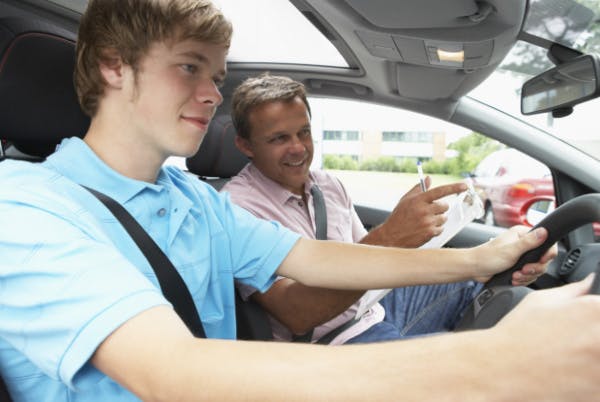
It isn’t just instructors who can help you learn to drive. Learners can also benefit from practice outside of lessons with a family member or friend. In fact, the DVLA suggests that most learners take about 22 hours of driving accompanied by someone other than their driving instructor. During this time it’s possible to consolidate what you’ve been taught by a professional, and gain vital experience on the road.
However, before you let just anyone accompany you out and about, there are a few rules you (and they) need to be aware of.
Who is allowed to supervise a learner driver?
Anyone supervising you as a learner must be deemed to have the relevant experience. Of course, it’s difficult to gauge the exact amount of driving each individual has taken, so the DVLA states that supervising drivers must have held a valid driving licence from either the UK or from elsewhere in the EU or European Economic Area (EEA) for at least 3 years.
It also enforces a blanket ban on anybody under the age of 21 sitting with a learner driver. If your friend or family member has ever been disqualified from driving, this time does not count towards the 3-year period. What’s more, the driving licence they hold must allow them to drive the vehicle that you are practising in.
So, manual licence-holders would be able to supervise you in either a manual or automatic, but anyone with an automatic licence would be prohibited from supervising you if you’re learning in a manual.
What other rules are in place when sitting with a learner?
You don’t just have to make sure that the person you practice with fulfils the above criteria; there are other laws in place to make sure you are driving legally.

Passenger seat
It’s important that the person sitting with you is on hand to help you if need be. To do this effectively, they need to be in the front of the car with you—so no backseat driving from your family or friends!
Payment
You must not pay anybody to supervise your driving unless they are an Approved Driving Instructor (ADI). It is an offence to give anyone who is unqualified money for helping you practice.
Under the influence
Your supervising driver is as responsible for your driving as you are; any rules that apply to you also apply to them! So, just as you are required to be sober, the person accompanying you must also be below the UK alcohol limit, and not be under the influence of drugs. Remember, this also means you can’t act as the designated driver for a group of friends on a night out—unless there’s someone else sober with you in the passenger seat.
Phone use
Likewise with phones. It is illegal to be on a handheld mobile phone if you’re supervising a learner driver. It might seem harsh, but it makes sense, really: mobiles are a serious threat to concentration, and you want their focus to be on the road. So, no texting, no calling, and no setting up of a GPS. If your accompanying driver needs to use their phone, make sure you pull over and stop before they do so.
Eyesight
If you haven’t got the picture already, there are no double standards here. The very first part of the practical test involves you proving your eyesight is good enough to let you loose on the roads—so accompanying drivers must also be able to see sufficiently. That means that they must wear their glasses or contacts if they normally would for driving—no excuses.
Insurance
As a learner, you probably already know that you must be insured on the vehicle you’re practising in. If it’s your own car, the person sitting with you will probably already be covered by your insurance as well. You do need to watch out for the conditions of your specific policy, though. Some insurers only allow those aged 25 and above to sit with a learner driver. It’s their way of adding a bit more of a safeguard: older drivers are more likely to have more experience. If you ignore this stipulation, your insurance will be invalidated.
Driving without valid insurance is a serious offence, and you could both end up being fined and gaining points on your licences. Not sorted out your insurance yet? Find out how to get a good insurance deal as a learner driver.
Is the law changing on who can sit with a learner driver?

Despite the current restrictions, there have been calls to further tighten rules on who can sit with a learner driver. Campaigners would like prospective supervisors to be vetted through an online check before being allowed to accompany a green licence holder.
However, there are no plans to change the law in the immediate future—and as ever, we’ll keep you informed of any developments.
A few other things
Learning to drive can be nerve-wracking, so it helps to have a calm voice in the passenger seat, but you also need to be aware that it can be scary to be in the hands of a learner driver. If you're both stressed, it's easy to take it out on each other. Just make sure you don’t let any disagreements impose upon your safety—it’s simply not worth it.
And, if you’re struggling to find anyone to sit with you, or don’t have use of a car for extra practice, remember that there are always other ways to build experience once you’ve passed, such as taking a Pass Plus course. This can be pretty cost effective too—as we've mentioned in our young driver insurance guide, some insurers offer lower premiums to drivers who have taken a Pass Plus Course.
Subscribe for driving advice, offers & more
We'd love to let you know about our courses, news and offers via email. You may unsubscribe at any time.
Star Genie Limited trading as PassMeFast. Company number 10093359
Copyright © 2024 owned by Star Genie Limited
PassMeFast, Blue Tower, MediaCityUK, Salford, M50 2ST

